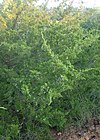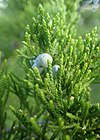Note: This is a project under development. The articles on this wiki are just being initiated and broadly incomplete. You can Help creating new pages.
Juniperus virginiana
Juniperus virginiana is an evergreen tree with a dense, narrowly erect to conical, round, or flattened canopy; it can grow from 12 - 30 metres tall. The plant is harvested from the wild for local use as a food, medicine and source of materials.
Contents
[hide]- 1 Uses
- 2 Parts Used
- 3 Chemical Composition
- 4 Common names
- 5 Properties
- 6 Habit
- 7 Identification
- 8 List of Ayurvedic medicine in which the herb is used
- 9 Where to get the saplings
- 10 Mode of Propagation
- 11 How to plant/cultivate
- 12 Commonly seen growing in areas
- 13 Photo Gallery
- 14 References
- 15 External Links
Uses
Skin problems, Chest complaints, Coughs, Colds, General weakness, Mouth ulcers, Colds, Rheumatism, Worms.[1]
Parts Used
Chemical Composition
Common names
| Language | Common name |
|---|---|
| Kannada | |
| Hindi | |
| Malayalam | |
| Tamil | |
| Telugu | |
| Marathi | |
| Gujarathi | |
| Punjabi | |
| Kashmiri | |
| Sanskrit | |
| English |
Properties
Reference: Dravya - Substance, Rasa - Taste, Guna - Qualities, Veerya - Potency, Vipaka - Post-digesion effect, Karma - Pharmacological activity, Prabhava - Therepeutics.
Dravya
Rasa
Guna
Veerya
Vipaka
Karma
Prabhava
Habit
Identification
Leaf
| Kind | Shape | Feature |
|---|---|---|
Flower
| Type | Size | Color and composition | Stamen | More information |
|---|---|---|---|---|
| {{{5}}} |
Fruit
| Type | Size | Mass | Appearance | Seeds | More information |
|---|---|---|---|---|---|
Other features
List of Ayurvedic medicine in which the herb is used
Where to get the saplings
Mode of Propagation
Seeds, Cuttings of mature wood.
How to plant/cultivate
Juniperus virginiana is a very cold-hardy plant, able to tolerate temperatures down to around -30°c when fully dormant. It grows in areas where the mean annual precipitation can range from 380 - 1,520mm.[4]
Commonly seen growing in areas
[[:Category:Herbs that are commonly seen in the region of |]], [[:Category:Herbs that are commonly seen in the region of |]], [[:Category:Herbs that are commonly seen in the region of |]], [[:Category:Herbs that are commonly seen in the region of |]], [[:Category:Herbs that are commonly seen in the region of |]].
Photo Gallery
References
- Jump up ↑ Indian Medicinal Plants by C.P.Khare
- Jump up ↑ [Chemistry]
- Jump up ↑ [Morphology]
- Jump up ↑ Cultivation
External Links
- Ayurvedic Herbs known to be helpful to treat Skin problems
- Ayurvedic Herbs known to be helpful to treat Chest complaints
- Ayurvedic Herbs known to be helpful to treat Coughs
- Ayurvedic Herbs known to be helpful to treat Colds
- Ayurvedic Herbs known to be helpful to treat General weakness
- Ayurvedic Herbs known to be helpful to treat Mouth ulcers
- Ayurvedic Herbs known to be helpful to treat Rheumatism
- Ayurvedic Herbs known to be helpful to treat Worms
- Herbs with Fruits used in medicine
- Habit - Evergreen tree
- Index of Plants which can be propagated by Seeds
- Index of Plants which can be propagated by Cuttings of mature wood
- Herbs that are commonly seen in the region of
- Herbs
- Pages without herbs images






